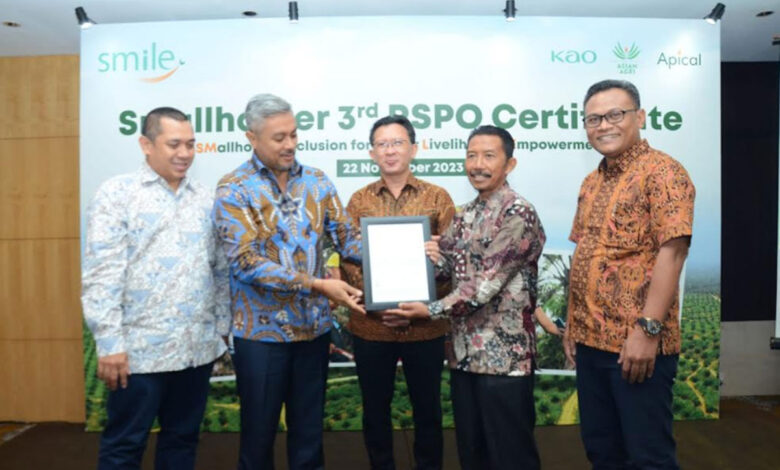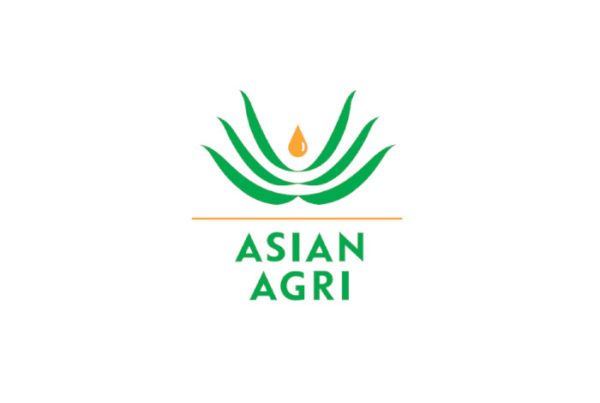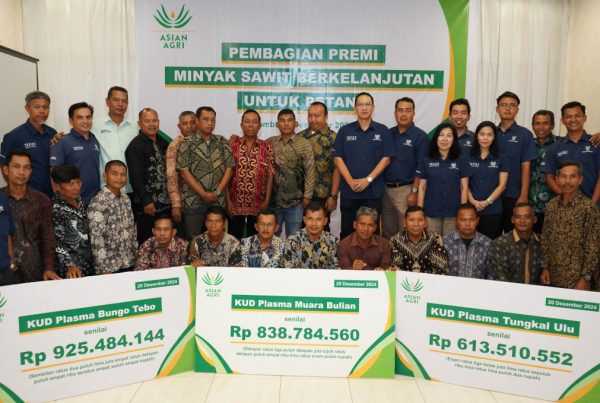Jakarta, 22 November, 2023 – The SMallholder Inclusion for better Livelihood & Empowerment (SMILE) programme, launched in 2020, has been successful in uplifting smallholders and supporting sustainable practices in Indonesia’s palm oil industry. With a focus on inclusivity and collaboration, the programme is proud to announce the achievement of its third cooperative receiving the Roundtable on Sustainable Palm Oil (RSPO) Certificate at the 2023 RT RSPO Meeting in Jakarta, which brings a total of 628 Independent Smallholders (ISH) from the programme certified.
Smallholders play a vital role in Indonesia’s palm oil sector, contributing significantly to the country’s total palm oil output. However, they face numerous challenges in meeting the rigorous sustainability criteria while striving to increase production. As independent smallholders’ today account for less than 20 percent of the total certified smallholder, the challenge is clear. Recognizing the importance of addressing these difficulties, Apical, Asian Agri, and Kao partnered to launch the SMILE Programme.
The SMILE Programme plays a very significant part of Asian Agri and Apical’s 2030 sustainability commitments towards inclusive growth. Through the SMILE Programme, smallholders like Sutoyo, the head Asosiasi Petani Sawit Swadaya Anugrah in Batanghari, Riau Province, who is responsible for 238 members with a total land cultivation of over 571 hectares, have found guidance and support in their journey towards sustainability.
Sutoyo’s cooperative has overcome significant hurdles to achieve the RSPO Certification, a testament to their commitment and the mentorship provided by the programme.
“Sutoyo’s story exemplifies the power of collaboration and resilience,” said Ivan Novrizaldie, Asian Agri Sustainability Head.
“With steadfast determination, Sutoyo and his cooperative embraced sustainable practices, addressed audit challenges, and emerged successfully with the RSPO Certificate. Their achievement highlights the importance of trust and a shared belief in finding solutions.”
Sutoyo explains that it the journey was not easy at first, since many of his members didn’t understand sustainability, but the efforts from the representatives were tremendous, helping and mentoring the members in every challenge they encounter, and providing them with all the best solutions to make the trainings and audit become achievable.
The SMILE Programme has been instrumental in providing essential training and assistance to smallholders, empowering them to adopt sustainable practices. By focusing on inclusivity and ensuring that no smallholder is left behind, the programme aims to elevate the industry’s sustainability standards.
“We believe that sustainability is a shared responsibility and that by fostering inclusivity, we can make a difference, and the only solution is through strong trust and collaboration spirit,” emphasized Bremen Yong, Apical’s Sustainability Director.
“The SMILE Programme is not just about the positive impacts we have achieved, but also the collaborative efforts nurtured throughout the supply chain. Sutoyo’s success symbolises the significance of SMILE’s continuous efforts to ensure that smallholders are equipped with the necessary knowledge and skills for ensuring sustainable good agricultural practices.”
RSPO Provides Full Support for the SMILE Progamme
RSPO fully encourages and supports the SMILE collaboration among palm oil supply chain actors in capacity building for independent smallholders in Indonesia.
“This leading initiative offers a significant business model that contributes towards our collective aspiration of empowering smallholders to improve livelihoods and increasing independent smallholders’ inclusion to achieve fully sustainable palm oil,” said Guntur Cahyo Prabowo, Head of Smallholders Program Indonesia.
SMILE Programme Heads to Third Phase
As the SMILE Programme enters its third phase, it remains committed to the mission of empowering smallholders and driving sustainable practices in the Indonesian palm oil industry. Through continued mentorship, training, and collaboration, the programme aims to uplift more cooperatives, enabling them to achieve the RSPO Certification and contribute to a resilient and sustainable palm oil sector.
About Asian Agri
Asian Agri is one of Indonesia’s largest palm oil producers. Founded in 1979, the company today manages 100,000 hectares of plantation land and employs over 20,000 people. A pioneer of the Indonesian government’s Trans-National Government Migration (PIR-Trans) program, Asian Agri currently works with 30,000 Scheme smallholders in Riau and Jambi who operate 60,000 hectares of oil palm plantations, and independent smallholders who manage more than 39,000 hectares.
Implementing a strict “no burn” policy since 1994 and best practices in sustainable plantation management, Asian Agri has helped its smallholder partners improve productivity, yield and supply chain traceability, while assisting them obtain certifications. The company’s mills are technologically advanced and energy self-sufficient, minimizing greenhouse gas emissions.
All business units of Asian Agri has the Indonesian Sustainable Palm Oil (ISPO). Currently, all Asian Agri’s plantations in North Sumatra, Riau & Jambi provinces and Scheme smallholder plantations in Riau & Jambi provinces have been 100% RSPO (Roundtable on Sustainable Palm Oil) certified. In addition, ISCC (International Sustainability & Carbon Certification) has been achieved by all plantations owned by Asian Agri and the smallholders it supports.
The company’s operations (CPO mills and KCPs) are ISO 14001 certified, while its Learning Institute and nursery research center in Pelalawan, Riau province, Indonesia are both ISO 9001 certified. Asian Agri’s laboratory at the Center for Research and Development in Tebing Tinggi is accredited by the National Accreditation Committee under the ILAC Mutual Recognition Arrangement (ILAC MRA).
Media Contact :
Corporate Communications, Asian Agri
Email : communications@asianagri.com
About Apical
Apical is a leading vegetable oil processor with an expanding global footprint. Our vertically integrated mid-stream refining and value-added downstream processing makes us an integral supplier that supports the needs of various industries namely food, feed, oleochemicals and renewable fuel, including sustainable aviation fuel (SAF) which enables a great reduction of CO2 emissions.
With integrated assets in strategic locations spanning Indonesia, China and Spain, Apical operates numerous refineries, oleochemical plants, renewable fuel plants and kernel crushing plants. Through joint ventures and strategic partnerships, Apical also has processing and distribution operations in Brazil, India, Pakistan, Philippines, Middle East, Africa, USA and Vietnam.
Apical’s growth is built on the foundations of sustainability and transparency, and motivated by our strong belief that we can contribute to a circular economy for a more meaningful impact, even as we continue to grow our business and deliver innovative solutions to our customers.
Media Contact :
Corporate Communications, Apical Group
Email: corpcomms@apicalgroup.com





